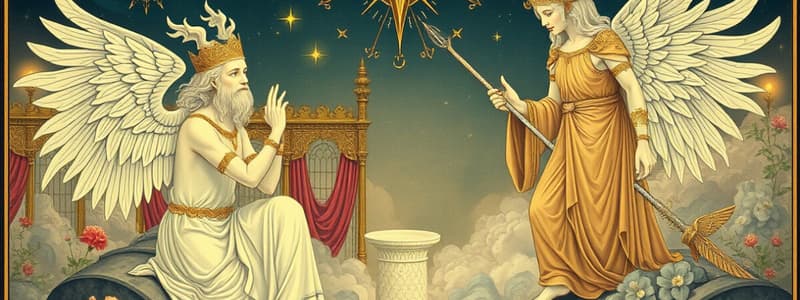Podcast
Questions and Answers
Do the gods know everything?
Do the gods know everything?
No, some gods can be wrong.
Some gods disagree with others.
Some gods disagree with others.
True (A)
What is a feature of Stoicism in Ancient Rome?
What is a feature of Stoicism in Ancient Rome?
- Focus on religious doctrines
- Emphasis on emotion
- Emphasis on morality and virtue (correct)
- Use of intuition in philosophy
Which philosopher is associated with the Renaissance Humanism?
Which philosopher is associated with the Renaissance Humanism?
What was the main focus of the Enlightenment philosophers?
What was the main focus of the Enlightenment philosophers?
Which of the following is associated with Empiricism?
Which of the following is associated with Empiricism?
Which period is associated with the school of Stoicism?
Which period is associated with the school of Stoicism?
Who is a notable philosopher from the Medieval Period?
Who is a notable philosopher from the Medieval Period?
Which school of thought emphasizes the use of reason and logic as the basis of knowledge?
Which school of thought emphasizes the use of reason and logic as the basis of knowledge?
Empiricism emphasizes gaining knowledge through intuition.
Empiricism emphasizes gaining knowledge through intuition.
What belief is central to Humanism during the Renaissance?
What belief is central to Humanism during the Renaissance?
The Enlightenment is characterized by the school of thought known as ______.
The Enlightenment is characterized by the school of thought known as ______.
Match the following notable philosophers with their corresponding schools of thought.
Match the following notable philosophers with their corresponding schools of thought.
Flashcards are hidden until you start studying
Study Notes
Greek Gods’ Knowledge
- Gods possess omniscience about morality and virtue.
- Disagreements between gods suggest differing viewpoints on truth and rightness.
- This raises the notion that some gods might occasionally err.
Ancient Rome Philosophy
- Historical Period: 1st century BCE to 5th century CE.
- School of Thought: Stoicism.
- Main Features: Focus on morality, emotional resilience, and the pursuit of virtue.
- Notable Philosophers:
- Seneca
- Epictetus
- Marcus Aurelius
Medieval Philosophy
- Historical Period: 5th to 15th centuries.
- School of Thought: Scholasticism.
- Main Features: Integrating philosophy to explicate and define religious doctrines.
- Notable Philosophers:
- St. Thomas Aquinas
- St. Augustine
- Meister Eckhart
Renaissance Philosophy
- Historical Period: 14th to 17th centuries.
- School of Thought: Humanism.
- Main Features: Emphasizes human experience; utilizing philosophy to comprehend society and human nature.
- Notable Philosophers:
- Petrarch
- Desiderius Erasmus
- Niccolo Machiavelli
- Francois Rabelais
Enlightenment Philosophy
- Historical Period: 17th to 18th centuries.
- School of Thought: Rationalism.
- Main Features: Knowledge derives from reason and innate intuition.
- Notable Philosophers:
- Rene Descartes
- Immanuel Kant
- Gottfried Leibniz
Enlightenment Empiricism
- Historical Period: 17th to 18th centuries.
- School of Thought: Empiricism.
- Main Features: Knowledge is acquired through sensory experiences; valued inductive reasoning.
- Notable Philosophers:
- David Hume
- Francis Bacon
- John Locke
Enlightenment Social and Political Philosophy
- Historical Period: 17th to 18th centuries.
- Focuses on ideal societal structures and the individual's role.
- Notable Philosophers:
- Voltaire
- Jean Jacques Rousseau
- Thomas Hobbes
Greek Gods’ Knowledge
- Gods possess omniscience about morality and virtue.
- Disagreements between gods suggest differing viewpoints on truth and rightness.
- This raises the notion that some gods might occasionally err.
Ancient Rome Philosophy
- Historical Period: 1st century BCE to 5th century CE.
- School of Thought: Stoicism.
- Main Features: Focus on morality, emotional resilience, and the pursuit of virtue.
- Notable Philosophers:
- Seneca
- Epictetus
- Marcus Aurelius
Medieval Philosophy
- Historical Period: 5th to 15th centuries.
- School of Thought: Scholasticism.
- Main Features: Integrating philosophy to explicate and define religious doctrines.
- Notable Philosophers:
- St. Thomas Aquinas
- St. Augustine
- Meister Eckhart
Renaissance Philosophy
- Historical Period: 14th to 17th centuries.
- School of Thought: Humanism.
- Main Features: Emphasizes human experience; utilizing philosophy to comprehend society and human nature.
- Notable Philosophers:
- Petrarch
- Desiderius Erasmus
- Niccolo Machiavelli
- Francois Rabelais
Enlightenment Philosophy
- Historical Period: 17th to 18th centuries.
- School of Thought: Rationalism.
- Main Features: Knowledge derives from reason and innate intuition.
- Notable Philosophers:
- Rene Descartes
- Immanuel Kant
- Gottfried Leibniz
Enlightenment Empiricism
- Historical Period: 17th to 18th centuries.
- School of Thought: Empiricism.
- Main Features: Knowledge is acquired through sensory experiences; valued inductive reasoning.
- Notable Philosophers:
- David Hume
- Francis Bacon
- John Locke
Enlightenment Social and Political Philosophy
- Historical Period: 17th to 18th centuries.
- Focuses on ideal societal structures and the individual's role.
- Notable Philosophers:
- Voltaire
- Jean Jacques Rousseau
- Thomas Hobbes
Studying That Suits You
Use AI to generate personalized quizzes and flashcards to suit your learning preferences.




